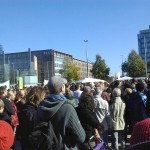
I just got back from Leipzig’s #globalchange festival/demonstration. At one point, I noticed two guys holding up an Israeli flag, and went over to ask what that’s about. It was the only national flag present and I wasn’t sure what it was doing there. “We’re here to provoke,” said one of the guys. “This demonstration is structurally anti-Semitic.” The idea, of course, is that a demonstration with anti-elite, anti-banker sentiment is anti-Semitic, whether the demonstrators know it or not. I tried to argue against this odd rhetoric, but he quickly said he doesn’t want to discuss it.
These counter-demonstrators are, I gather, anti-Germans. This is a movement considered to be left-wing and anti-fascistic, with a commitment to unconditional solidarity with Israel. The paradox of the “provocation” I witnessed is that this was the only mention of the “banking=Jews” stereotype I could detect in today’s demonstration, or indeed in all of the Real Democracy Now activities that led up to it in the past half year. It seems to me like the anti-Germans were the only ones bringing anti-Semitism into the demonstration. It annoys me to no end that they weren’t open to discussion, and this post is my attempt to say what I would have told them if they were willing to listen.
I recently read a pamphlet titled “The Past Didn’t Go Anywhere”, a fascinating guide to understanding and combatting anti-Semitism targeted at social change activists. It can be found online [PDF] and I highly recommend reading it, especially if you are involved in any kind of movement for social change. It makes the crucial point that anti-Semitism is:
“a divide-and-rule strategy that has served to maintain ruling classes, conceal who actually has power, and confuse us about the real systems of oppression that pit us against one another.”
(Chris Crass, Quoted on a now-defunct website hosting the pamphlet.)
Historically, rulers and ruling elites have used anti-Jewish sentiments to deflect the anger of the oppressed masses towards a relatively powerless group (Jews). In a way, it comes down to rulers explicitly or implicitly fostering the belief that the Jews, not the rulers themselves, are the problem.
What those anti-Germans were trying to do today was the same in reverse – delegitimizing an expression of legitimate grievance against the ruling class by claiming it’s an illegitimate expression of intolerance against Jews. This makes me pretty angry, I have to say. If I had detected any anti-Semitic sentiment or rhetoric from the demonstrators, I would go berserk. But I felt very comfortable at the demonstration, felt it was a matter of global solidarity, explicitly inclusive to me (with my irrelevant Jewish background) and to anyone else. The first thing that made me uncomfortable there was the anti-Germans with that big Israeli flag. How dare they insinuate that the German banking system is controlled by Jews? Where the heck did they get that idea?
You know what, I don’t actually know the names and backgrounds of any major German bankers. And I don’t need to. We were demonstrating against the absurd situation in which Europe and the world are in crisis yet the number of millionaires in Germany has only increased. We were demonstrating because we’re told things are going to get hard and we have to live in fear of economic collapse while those who were involved in creating this mess have nothing to fear and they continue to control much more wealth than the rest of us. Even if it so happened that 99% of German bank owners are Jewish, this wouldn’t have been an anti-Semitic demonstration.
Speaking out against someone who happens to be a Jew is not anti-Semitism. Speaking out against “the Jews” or attacking someone because they’re a Jew is anti-Semitism. Is those anti-Germans’ approach supposed to somehow protect Germany from a resurgence of anti-Semitism? Seems to me like at the very least, it muddies the waters and creates confusion about what is or isn’t anti-Semitic, making it easier for real intolerance to fly in under the radar. Even worse, it can actually re-enforce anti-Semitism by suggesting that speaking out against the powers that be is speaking out against Jews – supporting the false equation that “(the) Jews” are responsible for the power structures we live within.
There. I think I got it out of my system now. Has anyone else encountered similar situations, where people meaning to fight intolerance end up implicitly encouraging it?

